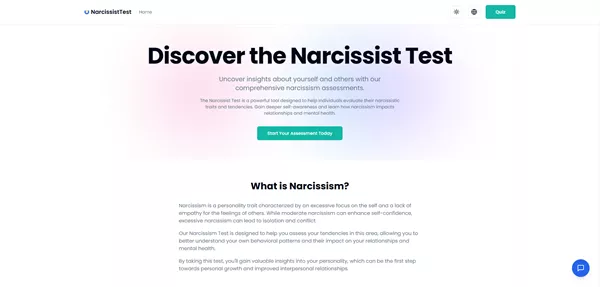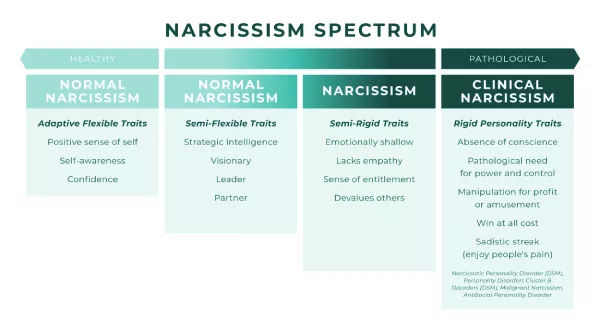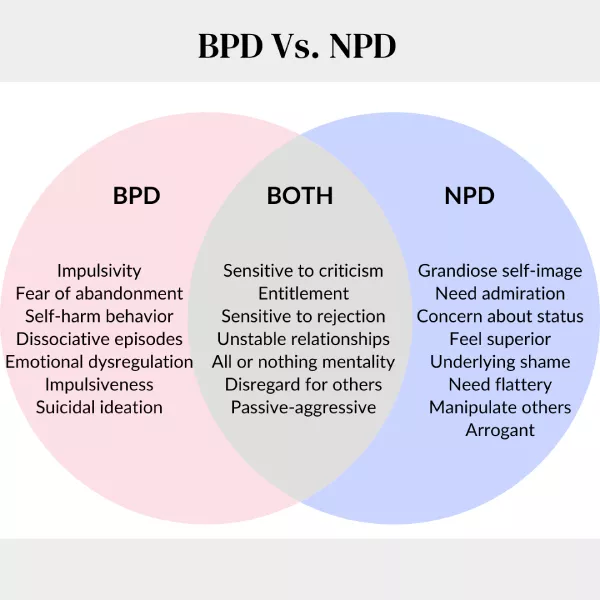ฉันเป็นคนเห็นแก่ตัวหรือไม่? ลองทำแบบทดสอบบุคลิกภาพเห็นแก่ตัวฟรีของเราและค้นหาคำตอบ
February 27, 2025 | By Rowan Thorne
คุณกำลังสงสัยอยู่หรือไม่ว่า "ฉันจะรู้ได้อย่างไรว่าฉันเป็นคนเห็นแก่ตัว?" นี่เป็นคำถามที่หลายคนถามตัวเองขณะที่พวกเขากำลังเรียนรู้ความซับซ้อนของภาพลักษณ์ตนเองและความสัมพันธ์ คุณอาจจะประหลาดใจกับสิ่งที่คุณค้นพบ ลองทำแบบทดสอบบุคลิกภาพเห็นแก่ตัวฟรีของเราเพื่อสำรวจแนวโน้มการเห็นแก่ตัวของคุณ แบบทดสอบนี้อาจเป็นขั้นตอนแรกในการทำความเข้าใจตัวเองให้ดียิ่งขึ้น! พร้อมที่จะเปิดเผยแนวโน้มการเห็นแก่ตัวของคุณหรือยัง? คลิกที่นี่เพื่อเริ่มต้นแบบทดสอบของคุณ!

ความหมายของการเห็นแก่ตัว: ความเข้าใจพื้นฐาน
การเห็นแก่ตัวมีอยู่บนสเปกตรัม ในขณะที่ความนับถือตนเองที่ดีต่อสุขภาพเป็นสิ่งสำคัญ โรคบุคลิกภาพเห็นแก่ตัว (NPD) เป็นเรื่องที่แตกต่างกัน NPD เกี่ยวข้องกับความรู้สึกที่สำคัญเกินจริง ความต้องการความสนใจและการชื่นชมอย่างมาก ความสัมพันธ์ที่ยุ่งยาก และการขาดความเห็นอกเห็นใจผู้อื่น การทำความเข้าใจความแตกต่างระหว่างความมั่นใจในตนเองที่ดีต่อสุขภาพและ NPD เป็นสิ่งสำคัญสำหรับการประเมินตนเองที่ถูกต้อง

มี ประเภทของการเห็นแก่ตัว ต่างๆ กัน การเห็นแก่ตัวแบบโอ้อวดนั้นมีลักษณะเป็นความเย่อหยิ่งที่เปิดเผยและความปรารถนาที่จะได้รับการชื่นชม ในทางกลับกัน การเห็นแก่ตัวแบบแฝงนั้นแสดงออกเป็นความอ่อนไหวต่อการวิพากษ์วิจารณ์ ความรู้สึกด้อยค่า และความต้องการการยืนยันที่แฝงอยู่ แบบทดสอบบุคลิกภาพเห็นแก่ตัว ของเราได้รับการออกแบบมาเพื่อช่วยให้คุณสำรวจแง่มุมต่างๆ ของการเห็นแก่ตัวเหล่านี้
คำถามในแบบทดสอบของเรานั้นอ้างอิงจากมาตราส่วนที่ได้รับการยอมรับ เช่น แบบสอบถามการชื่นชมและการแข่งขันแบบเห็นแก่ตัว (NARQ) แบบสอบถามบุคลิกภาพแบบเห็นแก่ตัว (NPI) และแบบสอบถามความผิดปกติทางจิตใจแบบย่อ (B-PNI) เครื่องมือเหล่านี้ถูกนำมาใช้กันอย่างแพร่หลายในการวิจัยทางจิตวิทยาเพื่อประเมินลักษณะนิสัยแบบเห็นแก่ตัว
ทำไมต้องทำแบบทดสอบบุคลิกภาพเห็นแก่ตัว?
ทำไมต้องเสียเวลาทำ แบบทดสอบบุคลิกภาพเห็นแก่ตัว กันล่ะ? ประโยชน์หลักคือ ประโยชน์ของการรู้จักตนเอง การทำความเข้าใจแนวโน้มการเห็นแก่ตัวของคุณสามารถช่วยให้เข้าใจรูปแบบพฤติกรรมและวิธีที่คุณปฏิสัมพันธ์กับผู้อื่นได้ ความรู้ความเข้าใจนี้อาจเป็นตัวเร่งให้เกิดการเติบโตส่วนบุคคลและความสัมพันธ์ที่ดีขึ้น คุณพร้อมที่จะเรียนรู้เพิ่มเติมหรือไม่?
การสำรวจลักษณะนิสัยแบบเห็นแก่ตัวของคุณสามารถเป็นเครื่องมือสำคัญในการ ปรับปรุงความสัมพันธ์ การรับรู้ถึงแนวโน้มของคุณในการครอบงำการสนทนา การแสวงหาการชื่นชมมากเกินไป หรือการขาดความเห็นอกเห็นใจสามารถช่วยให้คุณพยายามอย่างมีสติเพื่อเป็นคู่ครอง เพื่อน หรือสมาชิกในครอบครัวที่ดีขึ้น
การระบุความเสี่ยงของ NPD ในช่วงต้นเป็นอีกเหตุผลหนึ่งที่น่าสนใจ ในขณะที่แบบทดสอบของเราไม่ใช่เครื่องมือในการวินิจฉัย แต่สามารถระบุข้อกังวลที่อาจต้องการการประเมินจากผู้เชี่ยวชาญเพิ่มเติม โปรดจำไว้ว่า แบบทดสอบบุคลิกภาพเห็นแก่ตัว นี้ใช้เพื่อเป็นข้อมูลเท่านั้นและไม่ควรใช้แทนการวินิจฉัยจากผู้เชี่ยวชาญ หากคุณพร้อมที่จะทำแบบทดสอบของเราและก้าวไปอีกขั้นในการค้นพบตนเอง โปรดคลิกเพื่อ ทำแบบทดสอบฟรี!
แบบทดสอบบุคลิกภาพเห็นแก่ตัวฟรีของเรา: 20 คำถามเพื่อประเมินตนเอง
พร้อมที่จะเริ่มต้นการเดินทางแห่งการค้นพบตนเองหรือยัง? แบบทดสอบฉันเป็นคนเห็นแก่ตัวฟรี ของเราประกอบด้วย 20 คำถามที่ออกแบบมาอย่างพิถีพิถันเพื่อประเมินแนวโน้มการเห็นแก่ตัวของคุณ รูปแบบการทดสอบ นั้นตรงไปตรงมา: เพียงแค่ตอบแต่ละคำถามอย่างตรงไปตรงมาตามความรู้สึกและประสบการณ์ของคุณ มันง่ายกว่าที่คุณคิด!
เราให้ความสำคัญกับ การเข้าถึงและความง่ายในการใช้งาน คุณสามารถทำ แบบทดสอบบุคลิกภาพเห็นแก่ตัวฟรี ของเราได้บนอุปกรณ์ใดก็ได้ ไม่ว่าจะเป็นคอมพิวเตอร์ แท็บเล็ต หรือสมาร์ทโฟน ไม่จำเป็นต้องใช้ซอฟต์แวร์พิเศษหรือความรู้เบื้องต้นใดๆ เริ่มต้นแบบทดสอบของคุณตอนนี้!
จำเป็นต้องยอมรับ ข้อจำกัดความรับผิดชอบ แบบทดสอบนี้ไม่ใช่การทดแทนการวินิจฉัยทางคลินิก หากคุณกังวลเกี่ยวกับสุขภาพจิตของคุณ โปรดปรึกษาผู้เชี่ยวชาญที่มีคุณสมบัติเหมาะสม
การตีความผลลัพธ์แบบทดสอบบุคลิกภาพเห็นแก่ตัว
การทำความเข้าใจ ระบบการให้คะแนน เป็นกุญแจสำคัญในการตีความผลลัพธ์ของคุณ คำตอบแต่ละข้อสอดคล้องกับคะแนนเฉพาะ และคะแนนรวมของคุณจะบ่งบอกถึงแนวโน้มการเห็นแก่ตัวของคุณ คะแนนของคุณหมายความว่าอย่างไร?
การตีความทั่วไป มีดังนี้:
- ต่ำมาก: (ช่วงคะแนน: 20-33) คุณมีการเคารพตนเองที่ดีต่อสุขภาพ ค้นพบจุดแข็งของคุณ!
- ต่ำ: (ช่วงคะแนน: 34-49) บ่งบอกถึงการรับรู้ตนเองที่สมดุล ยอมรับความตระหนักรู้ในตนเองของคุณ
- ปานกลาง: (ช่วงคะแนน: 50-70) บ่งบอกถึงลักษณะนิสัยแบบเห็นแก่ตัวบ้างโดยไม่มีผลกระทบอย่างมีนัยสำคัญ สำรวจวิธีการสร้างความสัมพันธ์ที่ดีต่อสุขภาพยิ่งขึ้น
- สูง: (ช่วงคะแนน: 71-86) บ่งบอกถึงแนวโน้มการเห็นแก่ตัวที่โดดเด่นซึ่งอาจส่งผลกระทบต่อความสัมพันธ์ของคุณ พิจารณาการประเมินเพิ่มเติมเพื่อการเติบโตส่วนบุคคล
- สูงมาก: (ช่วงคะแนน: 87-100) บ่งบอกถึงลักษณะนิสัยแบบเห็นแก่ตัวที่แข็งแกร่ง ซึ่งบ่งบอกถึงความจำเป็นในการสำรวจเพิ่มเติม ดำเนินการเชิงรุกเพื่อทำความเข้าใจตัวเองให้ดียิ่งขึ้น
โปรดจำไว้ว่าการตีความเหล่านี้เป็นแนวทางทั่วไป การประเมินจากผู้เชี่ยวชาญ จากผู้เชี่ยวชาญด้านสุขภาพจิตที่มีคุณสมบัติเหมาะสมเป็นวิธีเดียวที่จะได้รับการวินิจฉัย NPD ที่ถูกต้อง
สิ่งที่ควรทำหากคุณคิดว่าคุณอาจเป็นคนเห็นแก่ตัว
หากผลลัพธ์ แบบทดสอบบุคลิกภาพเห็นแก่ตัว ของคุณบ่งชี้ว่าคุณอาจเป็นคนเห็นแก่ตัว สิ่งสำคัญคือต้องพิจารณา การขอความช่วยเหลือจากผู้เชี่ยวชาญ นักบำบัดหรือจิตแพทย์สามารถทำการประเมินอย่างละเอียดและให้คำแนะนำส่วนบุคคลได้ นี่คือการเพิ่มพลังให้กับตัวคุณเอง!

มี แหล่งข้อมูลมากมายสำหรับการเรียนรู้เพิ่มเติม เกี่ยวกับการเห็นแก่ตัวและ NPD สำรวจเว็บไซต์ที่มีชื่อเสียง อ่านหนังสือที่เขียนโดยผู้เชี่ยวชาญ และพิจารณาเข้าร่วมกลุ่มสนับสนุนเพื่อเชื่อมต่อกับผู้อื่นที่แบ่งปันประสบการณ์ที่คล้ายคลึงกัน ความรู้คือพลัง!
การมีส่วนร่วมในการ ไตร่ตรองตนเองและการเติบโตส่วนบุคคล นั้นสำคัญมาก ตรวจสอบรูปแบบพฤติกรรมของคุณ ระบุสิ่งกระตุ้นสำหรับแนวโน้มการเห็นแก่ตัว และทำงานอย่างแข็งขันเพื่อพัฒนาความเห็นอกเห็นใจและทักษะความสัมพันธ์ที่ดีต่อสุขภาพ เริ่มต้นวันนี้และควบคุมอนาคตของคุณ!
การเห็นแก่ตัวเทียบกับภาวะสุขภาพจิตอื่นๆ
เป็นเรื่องสำคัญที่จะต้องแยกแยะระหว่างการเห็นแก่ตัวและภาวะสุขภาพจิตอื่นๆ ความสับสนกับภาวะซึมเศร้าและความวิตกกังวล อาจเกิดขึ้นได้เนื่องจากการเห็นแก่ตัวอาจแสดงออกในลักษณะที่คล้ายคลึงกัน เช่น ความรู้สึกเศร้าหรือไม่สบายใจ

อย่างไรก็ตาม ความแตกต่างที่สำคัญในอาการ มีอยู่ การเห็นแก่ตัวส่วนใหญ่เกี่ยวข้องกับความรู้สึกที่สำคัญเกินจริงและความต้องการการชื่นชม ในขณะที่ภาวะซึมเศร้าและความวิตกกังวลเกี่ยวข้องกับความเศร้า ความกังวล และความกลัวอย่างต่อเนื่อง
ดังนั้น การวินิจฉัยที่ถูกต้อง จึงมีความสำคัญ การปรึกษาผู้เชี่ยวชาญด้านสุขภาพจิตสามารถช่วยแยกแยะระหว่างภาวะเหล่านี้และให้แน่ใจว่าคุณได้รับการรักษาที่เหมาะสม สุขภาพจิตของคุณมีค่า!
คำถามที่พบบ่อย
ฉันจะรู้ได้อย่างไรว่าฉันเป็นคนเห็นแก่ตัว?
วิธีที่ดีที่สุดในการได้รับข้อมูลเชิงลึกคือการประเมินอย่างครอบคลุม เช่น แบบทดสอบบุคลิกภาพเห็นแก่ตัว ของเรา อย่างไรก็ตาม การประเมินจากผู้เชี่ยวชาญมักจะแนะนำสำหรับคำตอบที่ชัดเจน
แบบทดสอบบุคลิกภาพเห็นแก่ตัวที่แม่นยำที่สุดคืออะไร?
ไม่มีแบบทดสอบ "แม่นยำที่สุด" เพียงแบบเดียว แต่แบบทดสอบที่อ้างอิงจากมาตราส่วนที่ได้รับการตรวจสอบแล้ว เช่น NARQ, NPI และ B-PNI ถือว่าเชื่อถือได้ แบบทดสอบของเรานั้นอ้างอิงจากมาตรการที่ได้รับการยอมรับเหล่านี้
ฉันจะเป็นคนเห็นแก่ตัวโดยไม่รู้ตัวได้หรือไม่?
ใช่ เป็นไปได้ที่จะไม่รู้ตัวเกี่ยวกับแนวโน้มการเห็นแก่ตัวของคุณ นี่คือเหตุผลที่เครื่องมือการประเมินตนเองเช่น แบบทดสอบบุคลิกภาพเห็นแก่ตัวฟรี ของเราอาจมีค่า ทำแบบทดสอบ คุณอาจได้เรียนรู้สิ่งใหม่ๆ!
คนเห็นแก่ตัวรู้หรือไม่ว่าพวกเขาเป็นคนเห็นแก่ตัว? คนเห็นแก่ตัวบางคนตระหนักถึงลักษณะนิสัยของพวกเขา ในขณะที่คนอื่นๆ ไม่ตระหนัก การขาดความตระหนักรู้ในตนเองเป็นลักษณะทั่วไปของ NPD
สิ่งใดที่สับสนกับคนเห็นแก่ตัว?
ภาวะต่างๆ เช่น ภาวะซึมเศร้า ความวิตกกังวล และแม้แต่ความนับถือตนเองที่สูง อาจถูกเข้าใจผิดว่าเป็นการเห็นแก่ตัวได้ หากคุณกังวลเกี่ยวกับผลลัพธ์ของคุณจาก การประเมินบุคลิกภาพเห็นแก่ตัว โปรดปรึกษาผู้เชี่ยวชาญ คุณสมควรได้รับคำตอบที่ถูกต้อง!
ทำความเข้าใจคะแนนการเห็นแก่ตัวของคุณ: ขั้นตอนต่อไป
ไม่ว่า คะแนนการเห็นแก่ตัว ของคุณจะอยู่ในช่วงต่ำมาก ต่ำ ปานกลาง สูง หรือสูงมาก การทำความเข้าใจตนเองให้ดียิ่งขึ้นเป็นขั้นตอนแรกและสำคัญที่สุด หากคุณพบว่า ลักษณะนิสัยแบบเห็นแก่ตัว ของคุณอาจเป็นปัญหา สิ่งสำคัญคือต้องดำเนินขั้นตอนต่อไปในการทำความเข้าใจว่าพวกมันส่งผลกระทบต่อความสัมพันธ์ของคุณได้อย่างไร อย่ารอช้า เริ่มดำเนินการวันนี้
ดำเนินการต่อในเส้นทางการ ค้นพบตนเอง ของคุณและพิจารณาการขอคำแนะนำจากผู้เชี่ยวชาญเพื่อการประเมินเพิ่มเติม พร้อมที่จะเรียนรู้เพิ่มเติมเกี่ยวกับตัวคุณเองหรือยัง?
โปรดจำไว้ว่าแบบทดสอบนี้ไม่ใช่การวินิจฉัยและไม่ควรใช้เป็นการวินิจฉัย หากคุณยังคงมีความกังวลเกี่ยวกับสุขภาพจิตของคุณ การขอ คำแนะนำจากผู้เชี่ยวชาญ เป็นความคิดที่ดีเสมอ ความเป็นอยู่ที่ดีของคุณมีความสำคัญ